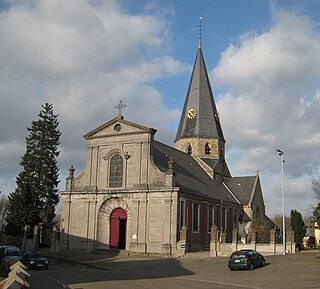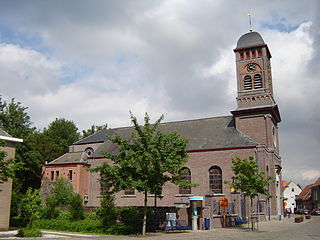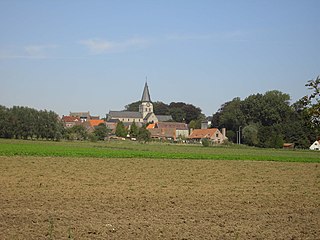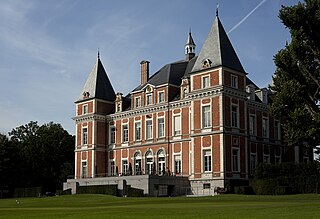
Bazel is a village in Belgium, in the municipality of Kruibeke in the province of East Flanders. The village is home to the Wissekerke Castle. The municipality of Bazel merged into Kruibeke in 1977.

Sint-Maria-Oudenhove is a village in the Denderstreek and in the Flemish Ardennes, the hilly southern part of the province of East Flanders, Belgium.

Hamal Castle is a castle in Rutten near Tongeren in the province of Limburg, Belgium, once the centre of the small independent lordship of Rutten. The castle was first mentioned in 1214. The current castle dates from the late 18th century.

The House of Ursel is the name of an important old Belgian noble family of German origin. The Head of the House is styled the Duke of Ursel, while other members are styled as Count/Countess d'Ursel.

Bornem Castle, also known as the Marnix de Sainte-Aldegonde Castle, is a country house, formerly a castle, located in Bornem, province of Antwerp, Belgium. Bornem Castle is situated at an elevation of 1 meters.

Vinderhoute is a village in the municipality of Lievegem in the province of East Flanders in Belgium. It is located in the Flemish Valley about 6 kilometres (3.7 mi) north-west of Ghent.

Bellem is a village and deelgemeente (sub-municipality) in the municipality of Aalter in the Belgian province of East Flanders. The village was originally called Bethlehem. Bellem is located about 16 kilometres (9.9 mi) west of Ghent.

Oud-Rekem is a village in the Lanaken municipality of the Limburg province of Belgium. The village is considered one of the most authentic villages of Belgium. Since 1994, it is protected as a monument.

Kerkom-bij-Sint-Truiden is a village in the Sint-Truiden municipality of the Limburg province in the Flemish Community of Belgium. Kerkom-bij-Sint-Truiden was an independent municipality until 1970 when it merged with Borlo. In 1976, the village opted to become part of Sint-Truiden.

Eigenbilzen is a village and former municipality in the Bilzen municipality of the Limburg province in the Flemish Community of Belgium. Eigenbilzen was an independent municipality until 1977 when it merged into Bilzen.

Bossenstein Castle is a château in the village of Broechem, Flemish Region, Belgium, which is a part of the municipality of Ranst.

Rutten is a village in the Tongeren municipality of the Limburg province in the Flemish Community of Belgium. The village is located in the Haspengouw region, and was a separate municipality until its merger into Tongeren in 1977.

Viane is a village in the Geraardsbergen municipality of the East Flanders province in the Flemish Community of Belgium. The village is situated in the Denderstreek in the south east of the province, on the border with Flemish Brabant and Hainaut. The river Mark separates the village from the rest of Geraardsbergen.

The Marquess of Wemmel was a Flemish title in use during the Ancien Régime, Wemmel is a city in Flanders.

Wemmel Castle is a former aristocratic estate in the centre of Wemmel in the Belgian province of Flemish Brabant. It was formerly the property of the noble House of Taye.

Huise is a village and deelgemeente (sub-municipality) on a hill within the municipality of Kruisem, part of the province of East Flanders in Belgium.
Raymond Pelgrims de Bigard was a Belgian industrialist, famous for the conservation and restoration of historic castles.

Petegem-aan-de-Schelde is a village and former municipality in the Wortegem-Petegem municipality in the Belgian province of East Flanders. The village officially changed its name from Petegem into Petegem-aan-de-Schelde in order to distinguish itself from Petegem-aan-de-Leie. In 1971, the municipality merged into Wortegem-Petegem.

Ocket Castle is a house, on the site of a castle, in Heusden, Destelbergen, East Flanders, Belgium. It probably originated on the former fief of Grooten Hoek that lasted until the 15th century. The castle was depicted on a 1725 map by PJ Benthuys as a building with a moat near the Scheldt and is mentioned in 1767 as a "partije genaemt den grieten hoeck met de mote ende huys van playsance". The present Neoclassical building dates largely from the 18th and 19th centuries but contains a dining room on the east side that in the 17th/18th century was the core of the structure, as was established among other things from the beams and the Rococo stucco decorations.

Bueren Castle is a 16th-century moated castle in Melle-Kwatrecht. The castle domain is 10 hectares and is located in two municipalities.



















